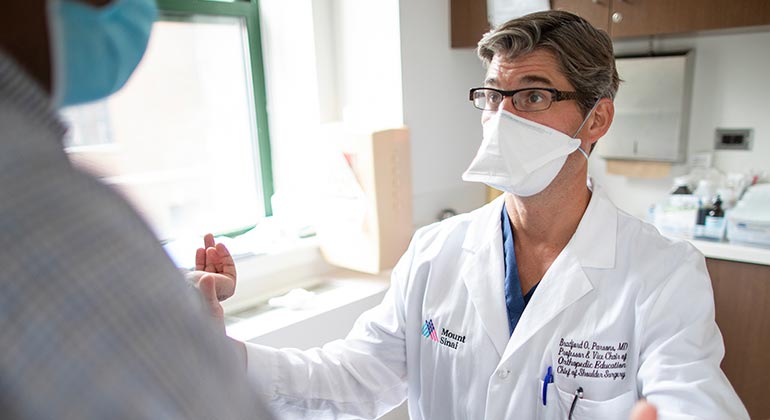
Preparing for Your Procedure at The Mount Sinai Hospital
At The Mount Sinai Hospital, we take pride in providing the highest quality care to all our patients. We want you to have the best possible experience before, during, and after your procedure—and the best possible outcome. To help you on your way, we provide instructions on how to prepare and what to expect. Please follow these instructions carefully.
Ensuring Your Procedure Takes Place
Before your procedure, please complete following:
- Complete any presurgical testing that is needed. Ideally, complete these tests 7 to 30 days before your procedure date. Your primary care doctor (PCP) can complete the required presurgical testing, or your surgeon may want you to have it completed at the Mount Sinai Hospital PreOperative Evaluation and Management (POEM) Center.
- Share any requested medical records: Make sure your surgeon has received any requested medical records, consultations or testing you have undergone in preparation for your procedure.
- Read our latest COVID-19 policies. Your physician will inform you of any necessary testing requirements.
- Secure an escort. If you are having a procedure and going home the same day, you will need to arrange for a person to accompany you home (an escort). Please read more about our escort requirements under Preparing for Your Procedure: General Information
- Follow your doctor’s instructions about which medications to take before your procedure.
Presurgical Testing at the PreOperative Evaluation and Management (POEM) Center
- Please note: Appointments at the POEM Center are only available if requested by your surgeon.
- If your surgeon has requested an appointment for you, you will be contacted by a member of our staff to schedule the appointment.
- POEM Center location
- 5 E 98th Street, 11th Floor
- No walk-in appointments are accepted
- POEM Center location
- On the day of your appointment:
- Bring a list of all the medications you are taking (including dietary supplements and herbal remedies)
- Bring a copy of any consultations or testing (including recent blood work) you have undergone in preparation for your procedure (if you have them)
- The contact information for your doctors who are not affiliated with Mount Sinai
- The clinical team will determine whether you need any additional consultations, blood work, EKG, or other testing at the time of your appointment
Planning Your Visit at The Mount Sinai Hospital
The day before your procedure, our scheduling team will call to tell you what time to arrive on the day of your procedure. If you do not hear from the scheduler by 5 pm the evening before your procedure, please call your surgeon’s office. The Mount Sinai Hospital is easily accessible by car, subway, or bus. If you plan to drive, you can park in The Mount Sinai Hospital Parking Garage, located at 1292 Park Ave, New York, NY. The entrance to this garage is on 99th Street, between Park and Madison Avenues. If your family or friends need accommodations, we recommend viewing nearby hotel accommodations here.
The Day of Your Procedure
When you arrive for your procedure, please go to the registration location for your procedure. For many, but not all, surgeries at The Mount Sinai Hospital, this is on the Second Floor of the Guggenheim Pavilion. Please bring the following items:
- Government-issued ID (driver’s license, passport, or New York State ID)
- Health insurance card
- Prescription card, and pharmacy name and phone number
- Any physician referrals as requested
- Health care proxy information, if you have one (speak to your care team for more information)
- We recommend you wear glasses because unfortunately, we do not have supplies for contact lens care
- We suggest wearing comfortable clothes that are easy to take off and put on
- If you expect to be admitted and spend the night after your procedure, please bring any personal items you will need for your stay. Please bring only what you need, and leave your valuables, including jewelry, watches, rings, earrings, and cash at home.
Visitor Information at The Mount Sinai Hospital
You may only have one visitor with you on the day of your procedure. Due to COVID-19, our visitor policies change periodically; check our latest COVID-19 Visitor Policies.
Leaving the Hospital
Before you leave the hospital, your surgeon will give you instructions about medications, rest, and other things you need for a safe and comfortable recovery. If you have any questions, please speak with your doctor.
You must have an escort with you who is at least 18 years old when you leave the hospital.
Information About Billing and Insurance
For more information, please refer to our Billing and Insurance policies.
Medical Records
For information on how to obtain your medical records, please refer to the Medical Records section of our website.
My Mount Sinai App: Makes Managing Your Health Care Easier
MyMountSinai® is your online gateway to Mount Sinai physicians and services, as well as all of your medical records. The app enables you to take care of your health care needs on the go and communicate easily with your medical team.